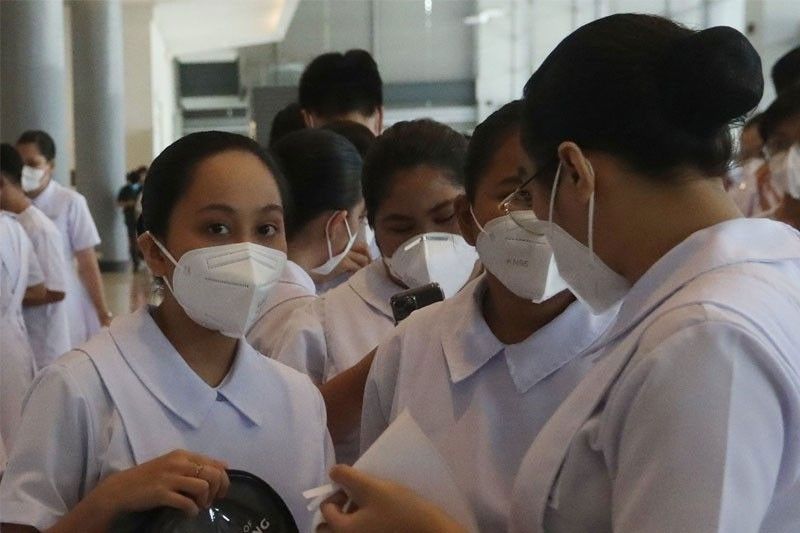German envoy: Hiring health workers part of agreement with Philippines, not 'piracy'

MANILA, Philippines — Germany has denied that it "pirates" — a term that means luring workers away from their current jobs — Filipino nursing students to fill the gap in their healthcare system, citing its almost decade-old agreement with the Philippines that facilitates the deployment of healthcare workers.
Historically, millions of Filipinos — including healthcare workers — have been leaving the Philippines for better pay and opportunities abroad, a practice that has meant billions of pesos in remittances to families in the Philippines for the past five decades.
"[Germany] works closely with [Philippine] schools, colleges, and agencies in our recruitment efforts. [Germany] offers good salaries, social services, and upskilling for [Filipino] healthcare workers," German Ambassador to the Philippines Anke Reiffenstuel said in a Twitter post on Tuesday.
The German envoy cited the Triple Win Program that was inked with the Philippines in 2013, which facilitates the deployment of healthcare professionals to Germany.
Germany ???????? is not pirating PH students!
— Ambassador Anke Reiffenstuel (@germanyinphl) January 17, 2023
???????? works closely with ???????? schools, colleges & agencies in our recruitment efforts. ???????? offers good salaries, social services & upskilling for ???????? HCWs. The ????????-???????? Triple Win Program is a big success!#germanyinphl @GIZ_Philippines https://t.co/mBakQ9enmJ
More nursing students are considering studying abroad as European countries such as the United Kingdom and Germany create "attractive packages", including tuition and lodging based on a report by The STAR newspaper.
De La Salle University Medical Center Employees' Union President Vilma Garcia was quoted in the report as being concerned that programs like this would eventually affect the Philippines’ own healthcare system as its manpower goes abroad.
READ: Foreign countries ‘pirating’ Filipino nursing students
What is the Triple Win Program?
Germany’s Triple Win Program with the Philippines is a deal between the German Federal Employment Agency and the Philippine Overseas Employment Administration (POEA), now the Department of Migrant Workers. Based on June 2021 figures from the Department of Foreign Affairs, there were around 6,000 Filipino nurses in Germany at the time, with 2,000 of them recruited through the government-to-government program.
It is designed to ease labor markets while minimizing the effect of brain drain in the partner country’s health sector, to allow countries to benefit from remittances, and to alleviate the shortage of nurses in Germany while supporting global mobility schemes.
Germany has entered into similar arrangements with Bosnia and Herzegovina, Tunisia, Indonesia, and the state of Kerala in India.
Under the program, local employment agencies will partner with Germany’s International Placement Services, which then provides recruited nurses with language courses and other relevant training for free before deployment.
The ILO Labor Agenda, which 45 labor unions and groups as well as employee associations signed, noted it is a good example of a bilateral agreement that protects workers’ rights. Aside from the government-to-government facilitation of hiring, Filipino healthcare professionals will be employed under the same conditions as their German counterparts.
RELATED: Workers seek clear bilateral agreements, union-to-union deals for OFW welfare
Last year, the Philippines and Germany inked a Memorandum of Understanding that will facilitate the deployment of Filipino healthcare professionals, skilled workers, and other professionals to Germany.
How much do nurses earn?
Based on March 2022 POEA data obtained from the Filipino Nurses United, nurses deployed under the TWP earn a minimum monthly salary of 2,300 euros or roughly P136,371.72. Nurses in the Philippines earn significantly less.
Those who work in private hospitals in the Philippines reportedly get paid around P12,000 a month, while those employed in government hospitals are entitled to Salary Grade 15 or just over P35,000. Pay is generally lower for those who work in the provinces.
READ: No shortage of nurses but low pay, lack of tenure driving them abroad
In September last year, President Ferdinand “Bongbong” Marcos Jr. promised that the government is working on improving wages and working conditions of nurses back home through the Philippine Nursing Practice Act.
"We will open more slots for the deployment of nurses abroad, while striving to improve opportunities domestically," Marcos Jr. said during the 100th anniversary commemoration of the Philippine Nurses Association.
READ: Marcos Jr. promises to improve working conditions of Filipino nurses
- Latest
- Trending

































